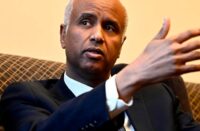When 18-year-old Carter Fay voted early in the US election, it felt like his future was hanging in the balance. A resident of the contentious state of Georgia, Fay is part of the estimated eight million Generation Z voters participating in a presidential election for the first time.
Fay is a representation of the growing unease among his generation. “Our democracy, I truly believe, is at a tipping point, and many of my peers feel the same,” he said. “To be honest, we’re frightened.”
These young voters, outraged at the current political climate and anxious about their future, are expected to play a significant role in the election. The race to the White House is anticipated to be neck and neck.
The youth found themselves disheartened when it seemed like the election would be another face-off between President Joe Biden and former president Donald Trump. Trump, however, was making progress among young voters, particularly white males without college education, as well as seeing increased support among young Black and Latino men.
The Democrats were apprehensive that the younger voters, feeling indifferent towards two older candidates, might not show up at the polls. However, after a turbulent presidential debate, Biden withdrew from the Democrat ticket, and Vice-President Kamala Harris was propelled into candidacy.
According to polls, the majority of young people support Harris, but there’s a clear gender divide. “Young men are significantly more pro-Trump,” stated Marc Trussler from the University of Pennsylvania. “However, even among young men, it’s probably a tie between Harris and Trump, perhaps slightly leaning towards Harris.”
The article also mentions a young voter named Evan, who believes that the current administration has made it difficult for him to run his business. This discontent, coupled with concerns about the “woke” culture of the left, has allowed Trump to connect with voters like Evan.
Both Harris and Trump have utilized various strategies to connect with first-time voters and those traditionally disinterested in politics. For instance, Harris has made appearances on popular podcasts and leveraged her celebrity endorsements, while Trump has hosted rallies and appeared on “bro” podcasts.
The Democrats’ success in reaching out to first-time voters via social media platforms like TikTok and Instagram, which Generation Z grew up on, has been praised. Fay emphasized that his peers are passionate about issues like climate change, social justice, education, and gun laws. He also mentioned that young women of his generation feel they have fewer rights than the previous generation.
The article concludes by mentioning that peer influence might play a crucial role in voter turnout. According to a poll from Harvard Kennedy School, the likelihood of youth voting increases significantly if their friends are voting. This could be pivotal, given that the youth vote was instrumental in Biden’s 2020 victory. If this trend continues, it could be beneficial for the Democrats in the upcoming election.





